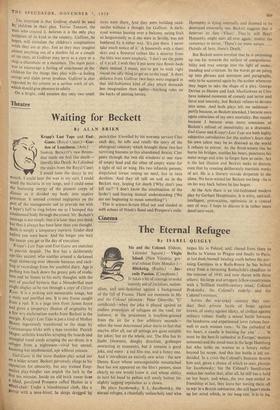Cadenza
RALPH CUSACK
Set in Ireland, the Scottish Highlands and the South of France, this is a wonderfully exciting and unconventional autobiographical fantasy by which Ralph Cusack proves himself a solo performer of genius.
. Book Society Recommendation. 18s.
No Language But a Cry
LENNOX COOK
"A very good novel which deserves to be widely read, both for its purely literary qualities and for the insight it gives into a social and human problem which our rulers, it seems, in spite of the Wolfenden Committee, still do not have the courage to face."— GORONWY REES (Listener).
"Mr. Cook writes with an admirable crisp- ness, drily and wittily, and his book has real distinction. It also has some of the most natural dialogue that 1 have read for a long time. "—Sphere.
"Writes confidently on a difficult theme .. . treated with rare sympathy . . . skilfully depicted."—Times Literary Supplement.
"Subtle and sympathetic."—Yorkshire Post.
"Writes in a lively unaffected style."—Times.
Book Society Recommendation. 155.
HAMISH HAMILTON How the Abbey Theatre helped rejuvenate poor old Kathleen ni Houlihan is now history; but history which, to judge by the results of Gerard Fay's researches, needed to be retold. Myth and legend, the staple of many of the early plays, have tended to cling to the story of the Abbey itself; and one of the chief merits of Mr. Fay's study is the cool eye with which he clears them away, re-examining those tendentious times— discussing the hopes, the plans, the quarrels— with an impartiality that is remarkable consider- ing that his book is, in effect, a rehabilitation of his father and his uncle. because Mr. Fay, himself for a time an impend- ing Young Roscius, saw too much of the anguished face behind the mask; or perhaps it simply is that he realises how easy it would be, looking back at the theatre his sub-title calls 'cradle of genius,' to overestimate the impact of the playwrights and players at the time. There are a number of criticisms which must be made of the book. The attempt to tie its loose ends together by a consideration of the state of the Abbey Theatre today was ill-advised, unless Mr. Fay was going to describe the middle years in greater detail—which would, as he admits, have entailed writing another volume. And he fails completely to establish the Abbey's connection with the rest of the Irish scene. The names of many of the writers remain familiar enough, and no doubt anybody who is interested in the Theatre will know of its fine actors, at least by reputation; but the other performers in what Yeats was to
call the casual comedy of those years—men such as Griffith, Connolly and Thomas MacDonagh
—are now all but forgotten in England; and an introductory chapter would have been useful. Mr. Fay, in fact, is oddly innocent in the matter of book-making:' this is a sketch for a portrait, rather than the finished work.
BRIAN INGLIS
Embarking for Cythera
Second Thoughts. By Michel Butor. (Faber, 180 The House of Ruby Wogan. By Norman Gear. (Putnam, I5s.)
Sigh for a Strange Land. By Monica Stirling' (Gollancz, 13s. 6d.)
Love and the Loveless. By Henry Williamson, (Macdonald, 16s.)


































 Previous page
Previous page